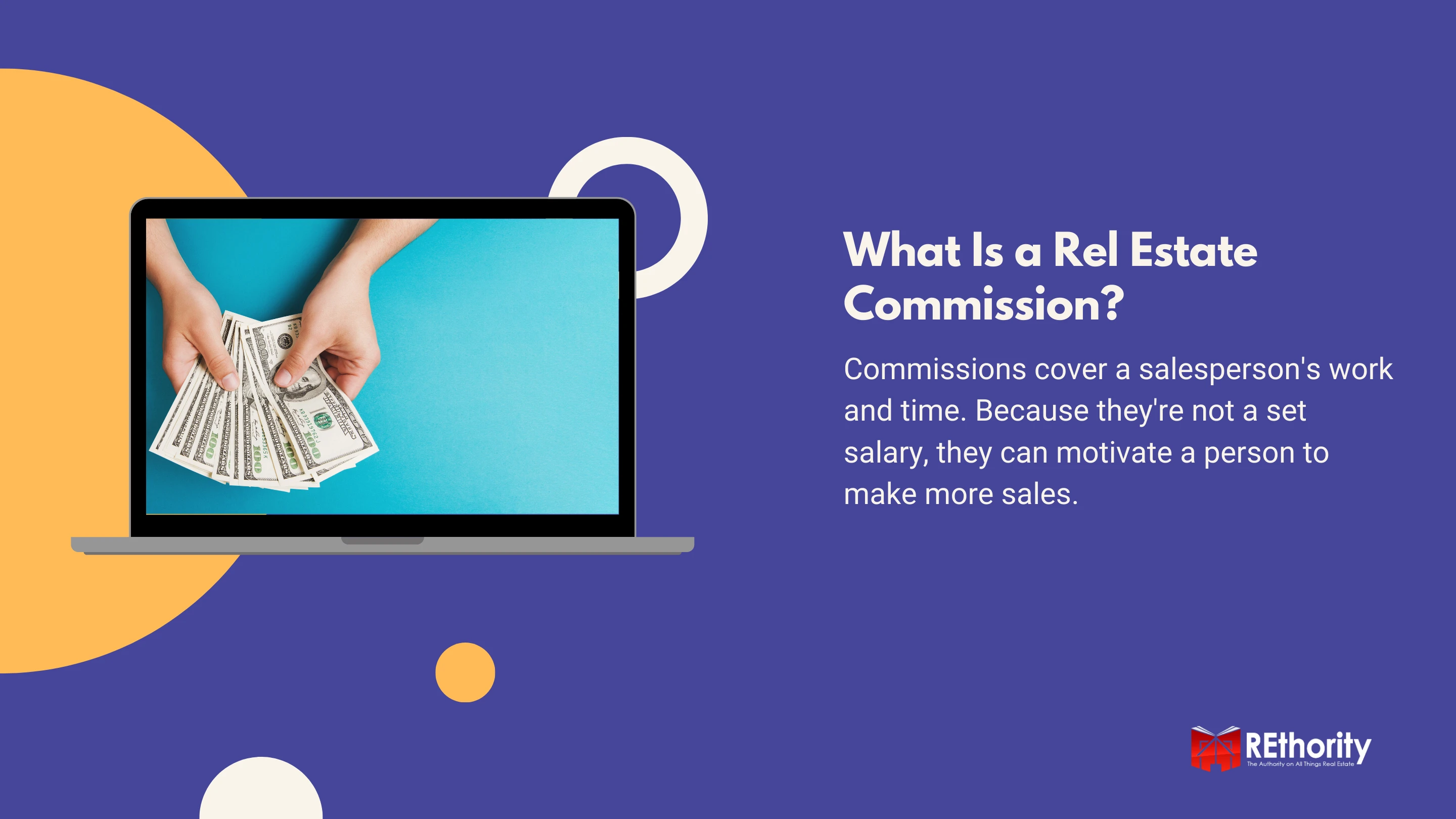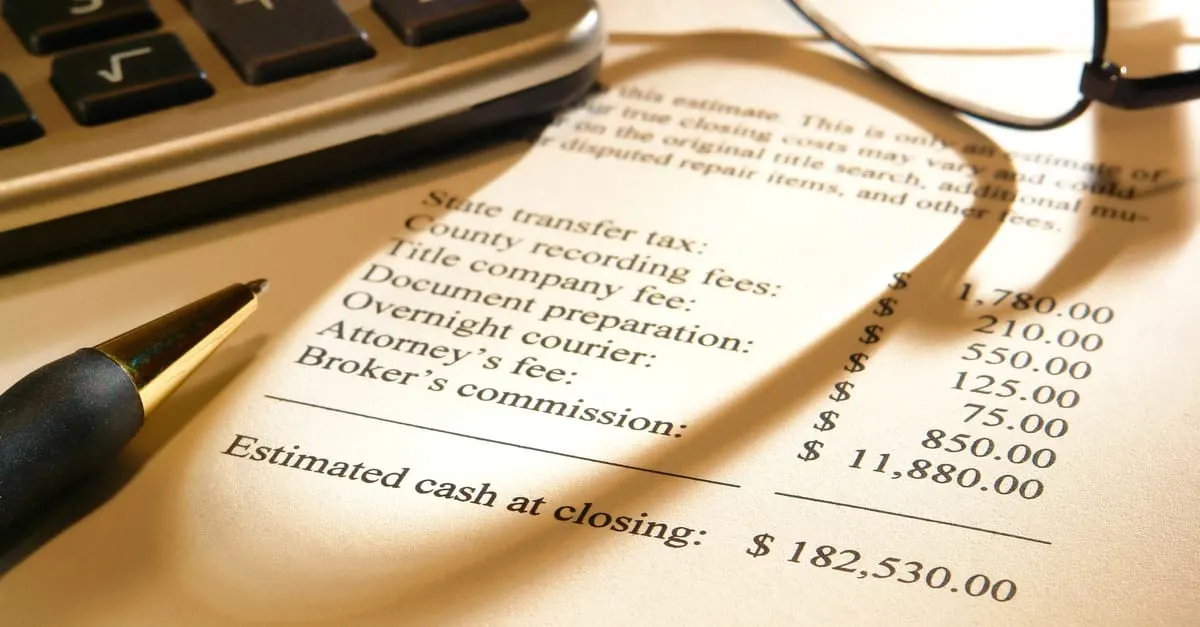Real estate agent commissions are tricky. Who pays them? And what is the average rate?
Are they negotiable? We’ll answer all this and more in our complete guide.
What Is a Real Estate Commission?
In sales, agents often earn a commission, or a percentage of the total sale, instead of a salary or flat fee. Whether the item being sold is software or a home, the principle of commission remains the same.
Commissions cover a salesperson’s work and time. Because they’re not a set salary, they can motivate a person to make more sales. The more homes that are sold, the more money an agent can make.
This concept is what puts real estate agents in charge of their own success. On the other hand, commissions can be intimidating for new agents who are just getting into real estate.

Many new agents will continue to work outside of real estate part-time until their commissions are enough to support them full-time.
When a real estate agent works with a client to help them buy or sell property, they earn their commission from the total purchase or sale price.
These commissions pay for a real estate agent’s time and expertise in a transaction. Agents are only paid after the transaction (sale or purchase) is completed.
Commission rates are not set or regulated by law, but there are industry norms that agents follow to charge a fair commission. We’ll look at those average rates next.
Average Real Estate Commission Rates
Average real estate commissions are about 5–6% of the final sale price. That equates to:
- About $7,500 commission (pre-split) selling a $150,000 home
- About $15,000 commission (pre-split) selling a $300,000 home

Ninamalyna/Shutterstock
Consider the amount of time, work, and expertise that goes into a real estate transaction. The average real estate transaction takes about 50 days to close. That’s nearly two months of work for an agent.
About 5% commission is average, but sellers might pay a higher or lower commission when:
- Selling land or property that is vacant. These sales average a 10% to 20% commission because they’re typically on the market much longer than homes.
- Engaging the realtor in a transactional agreement for a lower commission Transactional agreements don’t include the realtor’s full services but help a seller list the home, communicate with buyers, and write contracts for closing.
Managing the transaction from start to finish, real estate agents and realtors work long hours marketing the listings, handling appointments, showings, deadlines, inspections, contracts, phone calls, and negotiations with their clients.
How Is Commission Split?
Commissions don’t usually go entirely to one agent (except in the case of dual agency – more on that below). Typically, the total commission is split 50/50 between both agents involved in the transaction.
So that $7,500 commission from a $150,000 home sale would become $3,750 in take-home pay for the buyer’s agent and the listing agent.
Exceptions include:
- New agents may take a lower percentage of the total commission
- Outside agents that refer a buyer may earn a portion of the commission (about 25%)
- Dual agency rules in some states allow an agent to represent both the buyer and the seller, keeping the entire commission without splitting it
New agents might take a smaller percentage of the home sale if the more experienced agent did more work, facilitated the process more, or the brokerage has rules about commissions and seniority.

Lightspring/Shutterstock
For example, they may choose to split the commission 60/40 or 70/30, with the lower amount going to the new agent.
If another real estate agent brings a buyer in, the listing broker will pay a percentage. This would be 25% or so of the total agreed commission to that agent or broker as a referral fee.
In a dual agency transaction, an agent can represent both the buyer and the seller during a real estate transaction, but they must disclose their dual agency to both clients.
This is tricky because the agent has to act in the best interest of both the buyer and the seller. It doesn’t always work out. There are always conflicts of interest at some point in the sale.
In some states, dual agency is illegal. Right now, those states are Alaska, Colorado, Florida, Kansas, Maryland, Oklahoma, Texas, and Vermont.
If an agent can legally practice dual agency and make both parties happy during the process, they’ll be rewarded with a full 5-6% commission.
What Does the Commission Cover?
With the total commission amounts in mind, what specific real estate services is it covering? This is a partial list of the services a real estate agent provides during the listing and sale of a home or property.
- Determining the best listing price for the home
- Recording all property features and creating a sales description
- Listing the home in the MLS
- Arranging professional photos of the property to be taken
- Marketing the listing to potential buyers
- Negotiating with the buyer’s agent to get the seller the best sale price
- Guidance through contracts, financial details, lender information, etc.
- Ordering needed inspections and services
- Liaising with the title company
- Coordinating all appointments, meetings, and contract information
- Availability for phone calls, meetings, emails, and text messages
A buyer’s agent’s services are a bit different, with more focus on showing homes, negotiating with listing agents for the best deals, and providing guidance throughout the process.
They also coordinate and schedule all needed meetings and make themselves available for phone calls, texts, emails, or meetings when the buyer needs them.
Who Pays Realtor Commissions?
Commission fees are usually paid by the home seller, not the home buyer. This is taken out of the total sales price of the property. The 5-6% commission covers both their listing agent (seller’s agent) and the buyer’s agent.
In most cases, the buyer will be spending a lot of money on the purchase of a home, closing costs, down payments, moving, etc. The seller is often in a more favorable position to cover the commission cost because they’ve just sold a home.
The seller takes the commission out of the total sale price they manage to bring in and does not pay it before the sale of the home has been completed.
Who Pays Closing Costs?
The seller isn’t the only party responsible for paying up. Most of the time, the buyer pays closing costs, which equate to 2-5% of the total purchase price.

Olivier Le Queinec/Shuttersck
Closing costs and down payments are the two biggest financial obstacles for buyers because they have to be produced out-of-pocket.
Most mortgages won’t allow buyers to include closing costs in the total loan amount, making it a challenge to come up with up to 5% of the total purchase price at closing.
When a Seller Pays Closing Costs
There is an exception to the buyer paying closing costs, but it’s rare: getting the seller to pay the closing costs.
Typically, if the seller is to be negotiated into covering these costs, it will be at the expense of the buyer, who will agree to pay a higher dollar amount for the home.
Since that amount is added to the loan amount, the buyer has less cash to pay out-of-pocket. The seller gets additional cash to cover the closing costs and benefits from a higher sale price than expected.
Here’s an example:
The buyer will owe 3% closing costs on a home priced at $150,000. That equates to $4,500 in closing costs, so the buyer negotiates with the seller.
The buyer offers $155,000 for the home in exchange for the seller paying the closing costs out of the sale price (this must be in the final contract).
The buyer benefits by not needing nearly $5,000 in cash at closing, but the drawback is the monthly mortgage payments will be a bit higher due to the increased purchase price.
FSBO Commissions
Homes that are listed For Sale By Owner don’t have agents involved at all, so the seller can avoid paying any realtor fees or commissions to an agent. There are 2 main problems with this arrangement, though:
- Very few FSBO homes sell (they account for just 7% of last year’s home sales).
- FSBO homes sell for a lower amount. The average FSBO listing sells for $185,000; the average agent-represented home sells for $245,000.
If the seller is truly concerned about paying the agent commission, negotiating the commission rate is always possible. It will likely have better results than trying to sell the home without an agent.
Real Estate Commission Overview
Real estate agent commissions are the way hard-working agents get paid after a month-or-longer process of helping a client sell or buy a home.
Some of the key takeaways include:
- Agents should expect to split an average 6% commission with the other party’s agent (selling agent or buyer agent) at closing.
- If the property is a vacant lot or land, a much higher commission can be earned—up to 20% of the total sale price.
- Most of the time, the seller pays the commission from their total proceeds. Closing costs, on the other hand, are most often paid by the buyer and represent about 2–5% of the total sale price of the home.
- Those commissions cover the agents’ time and expertise in real estate, including preparing the house for photos and listing the property in the MLS.
- They also cover marketing the listing widely, managing and guiding the contract and closing process, locating a lender, and more.
Exceptions to these commission norms include FSBO sellers, who don’t pay any commission to an agent and choose to manage the process themselves.
After all, there are special negotiations that have the seller pay for closing costs in exchange for a slightly higher purchase price. Real estate agents bring a lot of valuable expertise and knowledge to the complex process of buying or selling a home.
They’re paid commissions only after closing on a property, so there can be up to 2 months of work involved. It can be a challenge to give 6% of the sale price of the home out of a seller’s profit to cover real estate agent commissions.
Should You Use a Real Estate Agent?
It may be tempting to avoid paying a real estate agent’s commission and sell the home FSBO. But as statistics show, the home isn’t as likely to sell at all or for a fair price without the help and guidance of an experienced agent.
If you are serious about selling your house effectively and for the best price, you should hire an experienced agent with a good reputation.
Our Favorite Real Estate School
Let’s face it: it’s the digital age, and your schedule is busy. Why tie yourself to a set schedule by choosing a brick-and-mortar school? Don’t worry, there’s an alternative.
Real Estate Express offers flexible course options that are completely online. This means you can take your real estate courses from the comfort of your own living room, whenever it is convenient for you.

